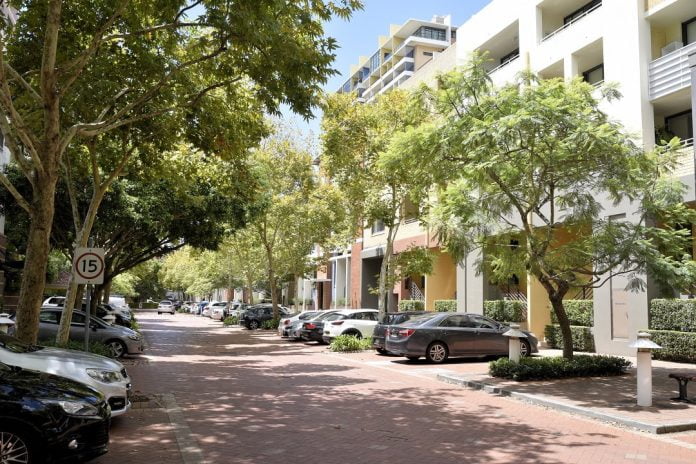ET Installs Integriti Nx Hik HID Nedap
♦ ET Installs Integriti Nx Hik HID Nedap – ET Security and Fire has installed Integriti access control, HID Signo readers, Nedap vehicle access readers, Hikvision cameras and an NX Witness VMS at Moore Park Gardens in Sydney.
Moore Park Gardens, which takes up an entire city block behind the heritage-listed former Tooths Brewery on the border of East Redfern and Alexandria, has 530 apartments, as well as swimming pool, gym, extensive underground carparking and a small retail precinct. I meet consultant Paul Charles of National Security Consulting, and the ET integration team for a look at this challenging application.
Charles designed the system after spending considerable time at Moore Park Gardens assessing the requirements of the site. According to Charles, planning and integration were a process severely impacted by pandemic lockdowns, as well as by the complexity of the site, the number of engaged interest groups and the challenges of mapping legacy security systems, many of which had been installed with the original build nearly 20 years ago.
“Our journey started back in 2019,” Charles explains. “It was a long process, partly because of COVID, but also because of the nature of over-arching site management, which has multiple interest groups, including 5 highly engaged strata committees and an association for public space, which are variously responsible for overseeing the site. This meant it was a consultative process just getting everyone singing off the same hymn sheet.”
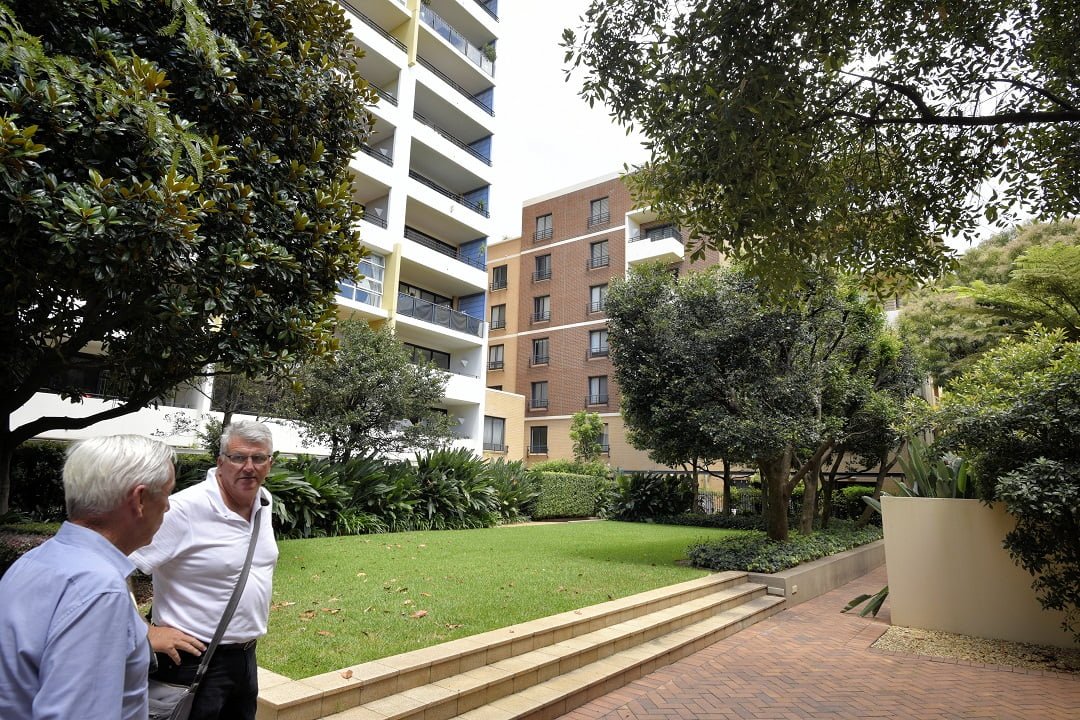
According to Charles, when he undertook a site survey in 2019 the site’s legacy CCTV system was a mess, in part because of its age, but also because of poor design and the fact the original installation took place on the cusp of the digital revolution. Describing the state of the system, he pulls no punches.
“When I first visited CCTV performance was so bad you wouldn’t be able to recognize your own mother if she walked by,” Charles says. “It was impossible to adequately assess the optical performance of the legacy system, while the coaxial infrastructure and system design was piecemeal – cable was coming in from all over the place and terminating at remote nodes, which management needed to attend to view event footage on hands and knees.”
In the face of this, a decision was quickly made to go with a fresh design, which included running a single-mode fibre LAN from multiple locations across the site back to a central location in support of CCTV and access control components.
“Once the nature of the backbone was decided, the process turned to working out which camera locations and angles of view would meet the operational requirements of site management,” Charles said.
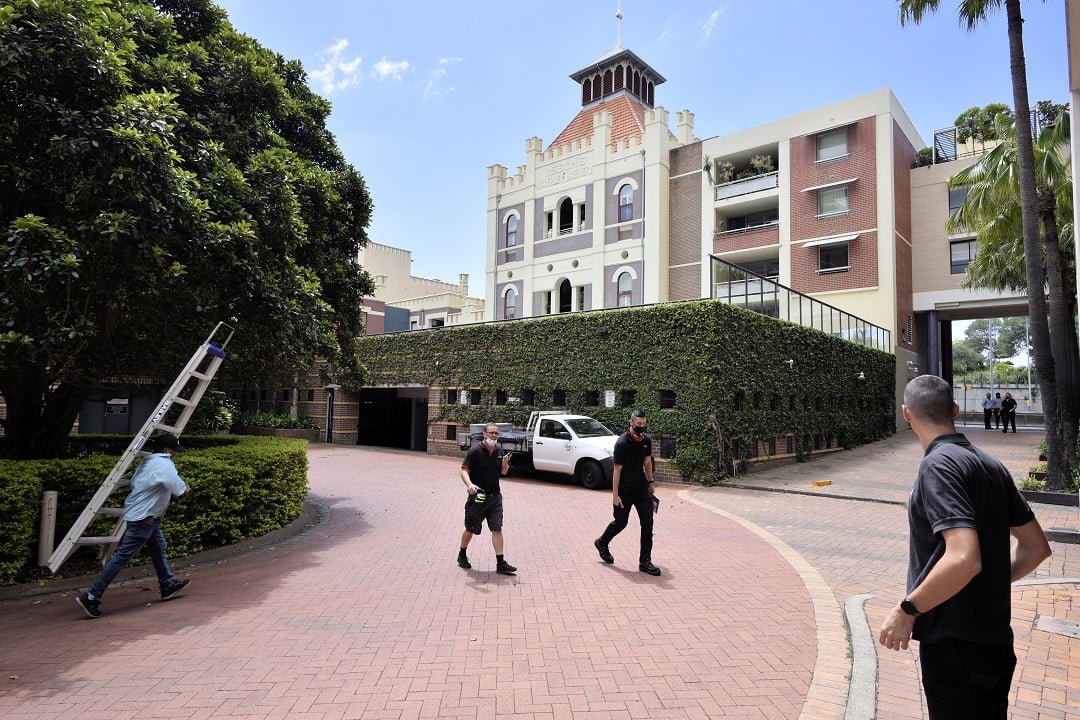
At this point, Charles shows me the plans for the new system, which include a diagram of an indicative shot, then the actual camera view that was chosen during planning – a process was undertaken for all 80 cameras at Moore Park Gardens.
“A plan like this makes installation much easier for integrators in the field,” Charles says. “They’re not working off an arrow on a plan – they can see the angle of view we want to achieve and can replicate it.
“Once the nature and design of the video surveillance component of the systems was mapped out, we went to tender – we had a site meeting and did a tender assessment and ET Security and Fire won the tender – a few days later COVID-19 hits.”
There’s a moment of silence around the table as all our minds go back to the weird unreality of March 2020. According to David McMicking of ET Security and Fire, the team had been issued the contract and had engaged a solicitor to finalise details when the world stopped.
“Given the uncertainty at that time, it was decided to park the project,” McMicking says. “It’s hard to wrap your head around it now, but in March 2020 when the world shut down, we didn’t know if people were going to be able to work, pay their mortgages and strata fees – we didn’t know if people were going to be able to retain their jobs – everything was uncertain.”
Access Control Takes Priority
As the months of that initial lockdown dragged by, with global attention focussed on infection and death rates, a re-think of the security upgrade was imposed by the sudden failure of the site’s unusual access control solution.
“There were 3 different access control systems with 3 different head ends on the Moor Park Gardens precinct and just as we all started thinking about restarting the CCTV project, this clunky access control solution broke down,” Charles said.
“What made assessing and repairing the legacy access control solution so difficult was its splintered nature – 3 head ends, none centralised in the office, no site-wide LAN – and the fact there were issues all over the place – firmware, hardware, software, design.”
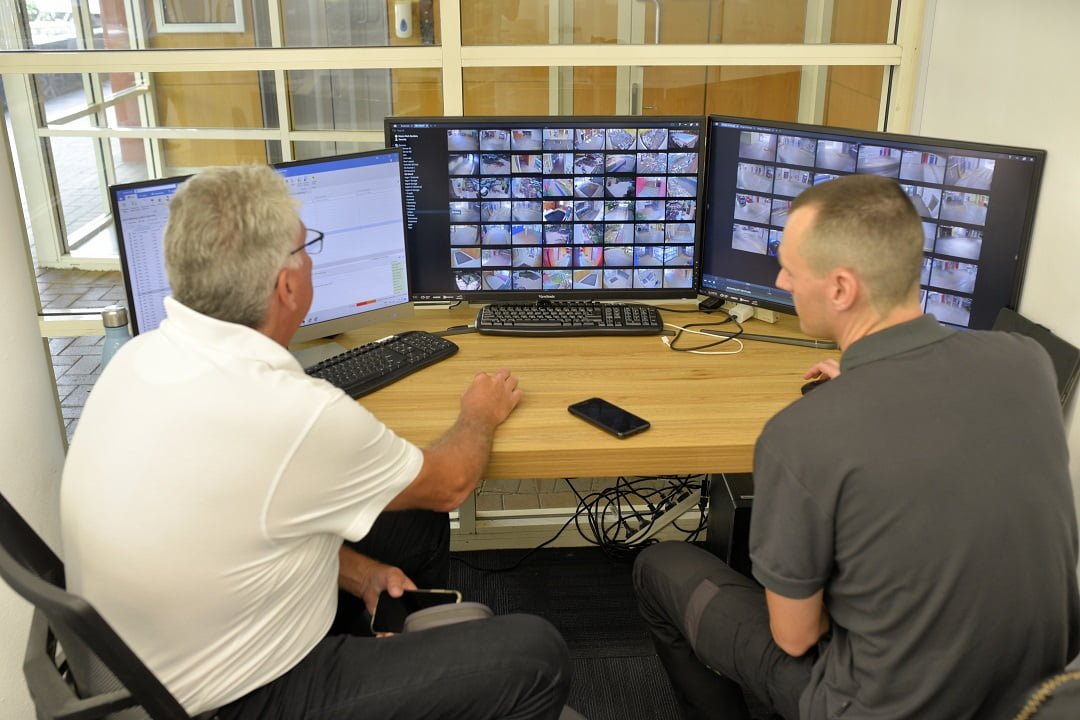
Charles says that unsurprisingly, when the access control system fell over, resolving that core service took precedence over plans to upgrade CCTV – access management of the precinct, including lifts, entry doors and vehicle barriers, were all compromised. With no reliable access control nobody could depend on accessing their homes.
“The system was quickly patched up to allow site management to take the expanded project back out to tender for CCTV and access control,” Charles said.
“With the second tender released, discussion with stakeholders turned to how we could best handle vehicle access – would we use carried fobs, would we use a different technology altogether – ultimately we decided to go with the hands-free Nedap RFID system to handle vehicles.”
While these discussions were going on, the second tender process concluded with Redfern-based integrator ET Security and Fire again the winner.
“In a moment of deja-vu, we commenced the job just as Sydney’s second lockdown started in June, 2021,” said ET’s David McMicking. “At this point it was vital the access control issues be resolved – many residents were working from home and for obvious reasons all stakeholders wanted the new access control solution installed as soon as possible.
“The first thing required was to install the new fibre LAN across the sites to support access comms and once this was complete, the access control installation carried out. Only when the new access control system was completely installed could we proceed with the video surveillance system.”
But before undertaking any of this, the existing access control systems and related electrical systems needed to be mapped out.
“We could find no drawings of the site showing security systems, nor schematics for any of the electrical systems and nobody on the site had any knowledge of where any of the access control equipment – the door controllers or the cabling – was located. Our first job was to do a complete audit of the existing access control system,” says McMicking.
“It’s a huge site and it took days to undertake a full site survey. There were things tucked away in non-adjacent cupboards and even after the system was mapped, techs would occasionally find a power supply or part of the intercom system hidden in some unexpected cupboard.
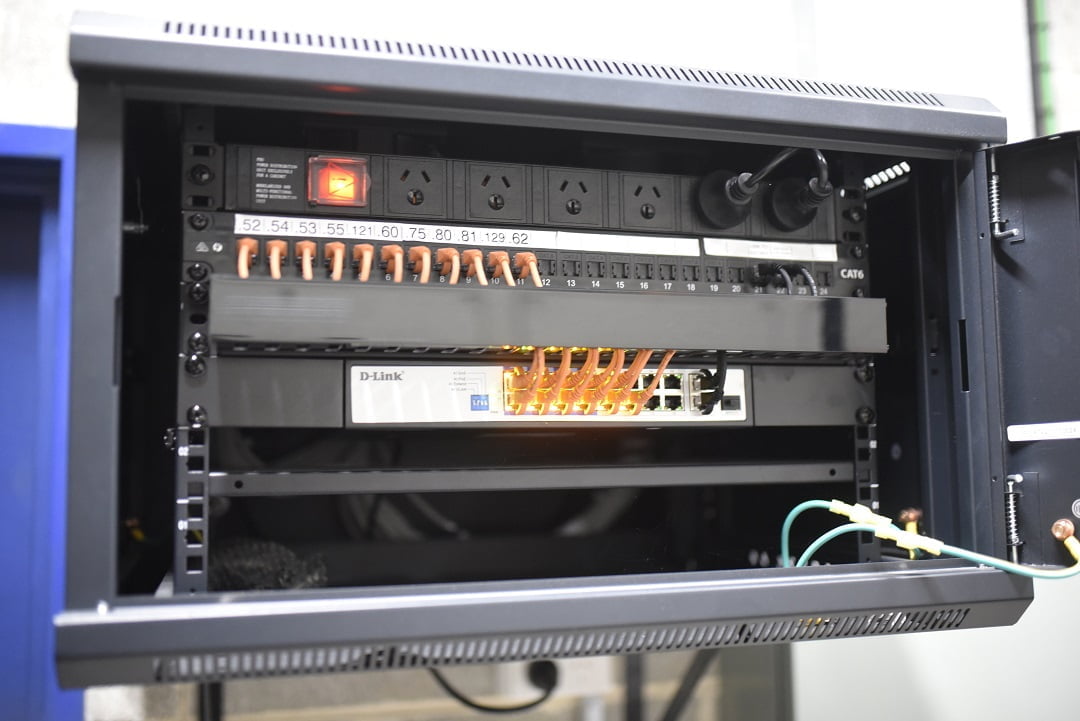
“Something we are really happy about is that building management has now got a proper plan of the security system – integrators in the future will find it easy to understand what was done here and why, how it all works, where the nodes are, where the cabling is, camera locations and angles of view, connectivity to lifts and locks and readers – it’s all in the palm of their hand.”
McMicking says that the access control upgrade was essentially a controller and expander swap out, unlike CCTV, where system size doubled.
“Door numbers remained the same and it was a matter of bringing door controllers from upgraded nodes back to a central location,” he explains. “As part of the process, the team installed a new LAN going to each of the remote door controllers linked with a main controller in the central location – in total there are 57 doors, 4 lifts and 10 roller doors residing on the access LAN.
“We kept certain key access control components, including door controller cabinets – we needed to retain these cabinets because the original intercom was vital to allow visitors to access units when visiting,” he explains. “Managing these requirements on a live site is not as easy as it sounds compared to doing everything from new on a greenfield site.”
As part of the access control upgrade, old and new system components ran alongside each other during commissioning and cutover – the cadence was undertaken on a building-by-building basis – a key element was ensuring residents always had access to their front doors and the car park.
“Once the new fibre LAN was completed, new controllers were installed in the head ends with all users programmed into the database and all fobs initiated – this was a big task given there are more than 500 apartments and thousands of users on the site,” McMicking says. “There was no downtime and after a thorough commissioning process, system cutover was undertaken with no issue.”
When it came to selecting the access control solution the decision was made to go with proven local system, Inner Range Integriti. Part of the legacy solution included Inner Range Concept 4000, allowing key components to be retained to save costs.
Managing the system is Integriti Gatekeeper, a sub-application of Integriti Pro that provides users with an intuitive user interface delivering all end user tasks, including monitoring and responding to events, assigning user permissions, arming and disarming areas, and plenty more.
“We went with the Integriti system because it’s a good bullet-proof solution that’s ideal for a site like this and we found the process of integration has been really good,” McMicking says.
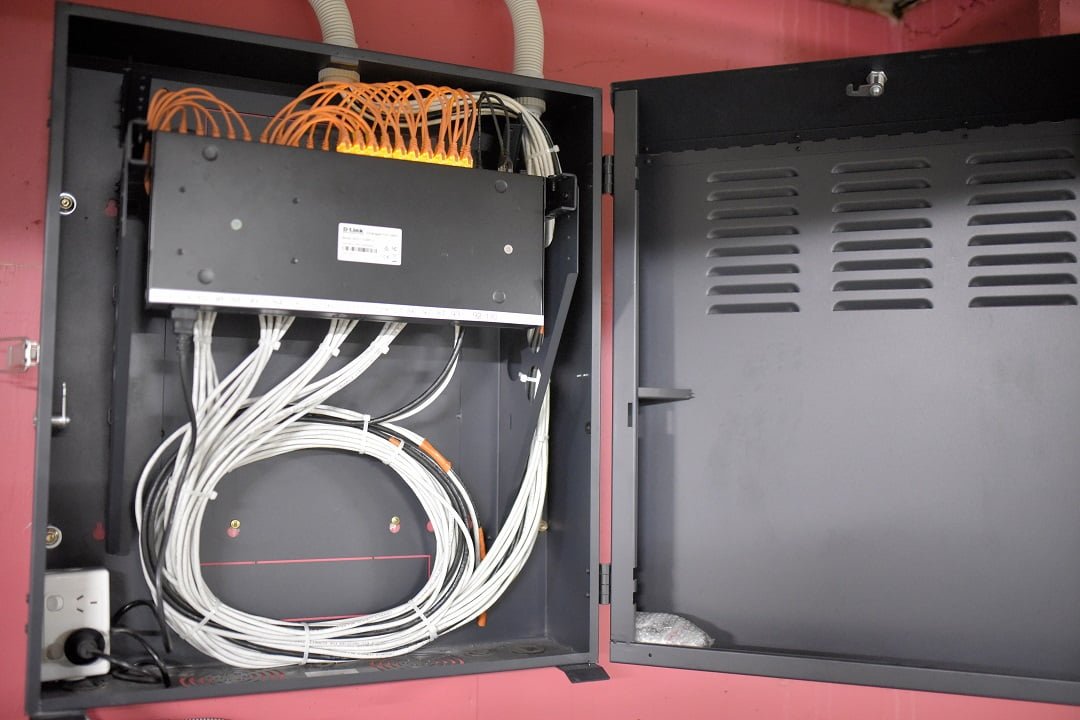
A key element of the access control solution that required lengthy consideration was vehicle access credential technology for the ET Installs Integriti.
“The original solution employed MDI’s Magic Button handheld wireless remotes and we needed to decide if we would stick with this style of technology or look at something else,” McMicking says.
“The remotes were not ideal in this application. Because the wireless receivers controlling the roller doors were located inside the carparks, residents would need to drive up to the roller shutters then get out of their cars and walk right up to the gate so their transmitter signals could reach receivers.”
According to McMicking, it was decided to go with the Nedap RFID solution supplied by ISCS, which combines readers at the entry points and tags installed on vehicle windscreens.
“This has proven the right choice and saves residents from waving their arms out the window trying to transmit a signal,” he explains.
“Most importantly, the stakeholders really liked the solution. When this option was put to committee members, we had some meetings with them and explained the differences in the technology and their reaction was that as a high-end building with a cutting-edge security solution they wanted a cutting-edge access control technology. Residents here are proud of the precinct – it’s seen as an iconic site.”
Another complex aspect of the ET Installs Integriti access control solution was rebuilding the database.
“Building management and the body corporates decided on the number of fobs they wanted per bedroom, and we worked in with them. We gave them a spreadsheet containing the key parameters required to build the Integriti database and they just populated it from there,” says ET Security and Fire’s Joe Sisson.
According to Sisson, the installation team took a database upload to get a list of unit numbers but built the new database entirely from scratch, adding unit numbers, resident names and contact details.
“We did this with input from the building management team – it was a process given there are 530 residences, 3000 user fobs and 700 RFID stickers,” Sisson says.
Video Surveillance Solution
The site’s CCTV solution took second place when it came to installation, though Charles maintains it’s now the component management and stakeholders see – especially given the vast improvement in image quality and ease of searching for incidents. And while video surveillance happened second, it was a real process getting things right.
“This was brownfield site with no fibre, no digital infrastructure anywhere – it was 54 analogue cameras on coax with VCR recording in meter rooms that staff had to visit to view, with all the challenges of that technology to contend with,” Charles explains.
The key element of CCTV outlined by stakeholders during planning was to know who came onto the site and what they did once they arrived – according to Charles, that meant face identification at entry points and situational awareness around the precinct – the solution that offered the best performance for budget was Nx Witness VMS and a selection of Hikvision cameras.
“When it came to the VMS, Nx was simply more affordable taking its feature set into account,” Charles explains. “I’ve worked with Nx Witness on a number of sites – it’s intuitive and clever – I decided to recommend it to the stakeholders at Moore Park Gardens – they accepted that recommendation and their choice has worked out really well.”
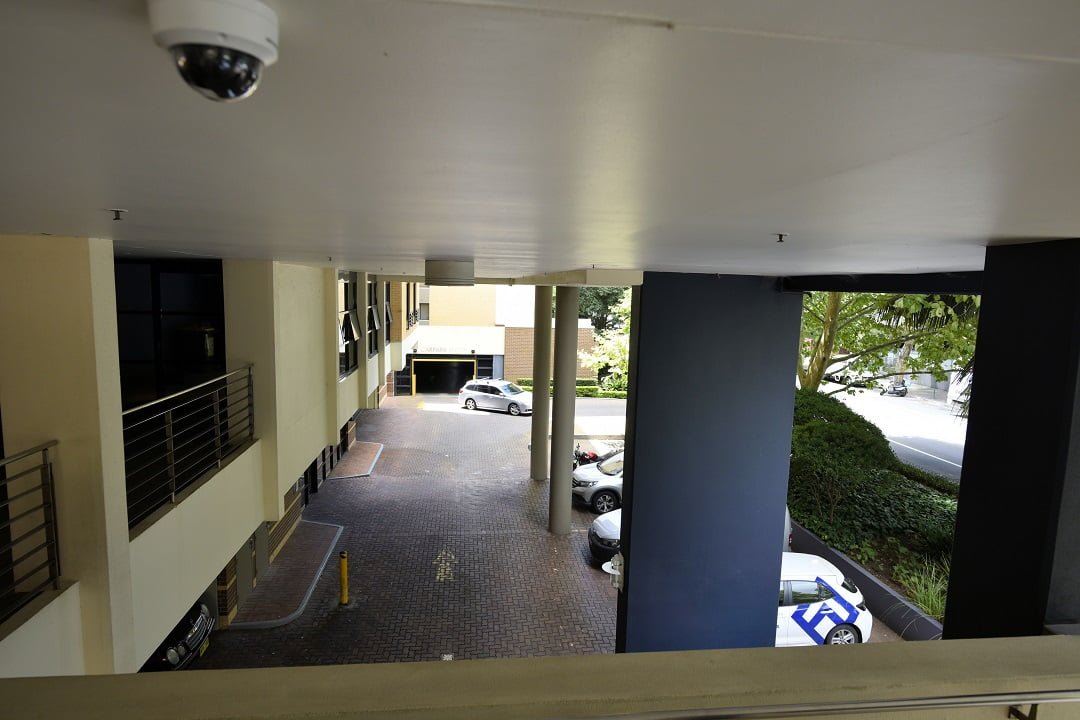
When it came to cameras, the stakeholders made the decision to go with a selection of 130 cameras mid-tier Hikvision dome cameras that offered excellent performance for the money.
Charles explains that a key element of the CCTV installation was the way the system design functioned from the point of view of installers. The initial stage of planning cameras and assessing required camera views took 2 days.
“A system design and the way it’s presented can make installation more intuitive for the integration team,” Charles explains. “Done properly, technicians are never in any doubt about what’s expected from the camera installation, because the system plan has an image of the camera location and an image of the camera view side by side.
“From the point of view of installers, the Moore Park Gardens plan marries up a camera number to a schedule with an in-depth description of the location of the camera, the camera type and shows the view required – this makes it easier for the techs. Installers quickly got to know the site and to understand the general philosophy of the system.”
As part of the installation Cat-6 cable needed to be run out to remote locations to support the new IP cameras at the 54 existing camera locations, as well as to the other selected camera locations around the site, none of which had been cabled before. Part of this process involved finding the most convenient prospective nodes.
Initially a temporary server was installed in the temporary building manager’s office to support the new CCTV solution – this was required because at the same time the CCTV system was being upgraded, the building manager’s office was being refurbished. When this refurbishment was complete, a permanent server and workstation was installed.
Challenges of the Installation
There were a number of challenges with this installation. They include the size and complexity of the site, the initial lack of schematics, the outbreak of COVID, the shifting goalposts of access control system failure and the large number of highly engaged stakeholders, all of which added layers of complication.
The precinct incorporates the old Tooth’s Brewery on the South Dowling Street side that’s heritage-listed – those requirements had to be considered when working in and around that part of the site. Stakeholders were another consideration. Each building has its elected owner’s corporation, while there’s also a site community association which looks after common areas, including the pool, the gym car, parks, public spaces and courtyards.
“So many different stakeholders wanting to have input required dedicated management processes,” Charles explains. “At the same time, the building management company was replaced halfway through the upgrade – that meant the new management team needed to be brought up to speed.”
When it comes to the pandemic, while COVID-19 interrupted the initial CCTV installation, it did not impact on the work once it began. There were a few questions from residents about whether the works were able to be undertaken in lockdown, but the importance of the access control replacement was easily explained, and the installers point out that most work was undertaken away from entries, with a lot of cabling in the underground carpark.
A much bigger challenges was the nature of the original solution – multiple access control systems installed in unusual ways.
“Just to give you an idea how bad it was, there were door controllers installed in chlorine-filled storage rooms under the pool – it was a corrosive environment and site management was wondering why the system kept breaking down,” McMicking says.
“Other challenges were running conduit externally when techs couldn’t go through a wall. That required a consultation process with the building manager to make sure they were happy with what they would be looking at once the system was completed.”
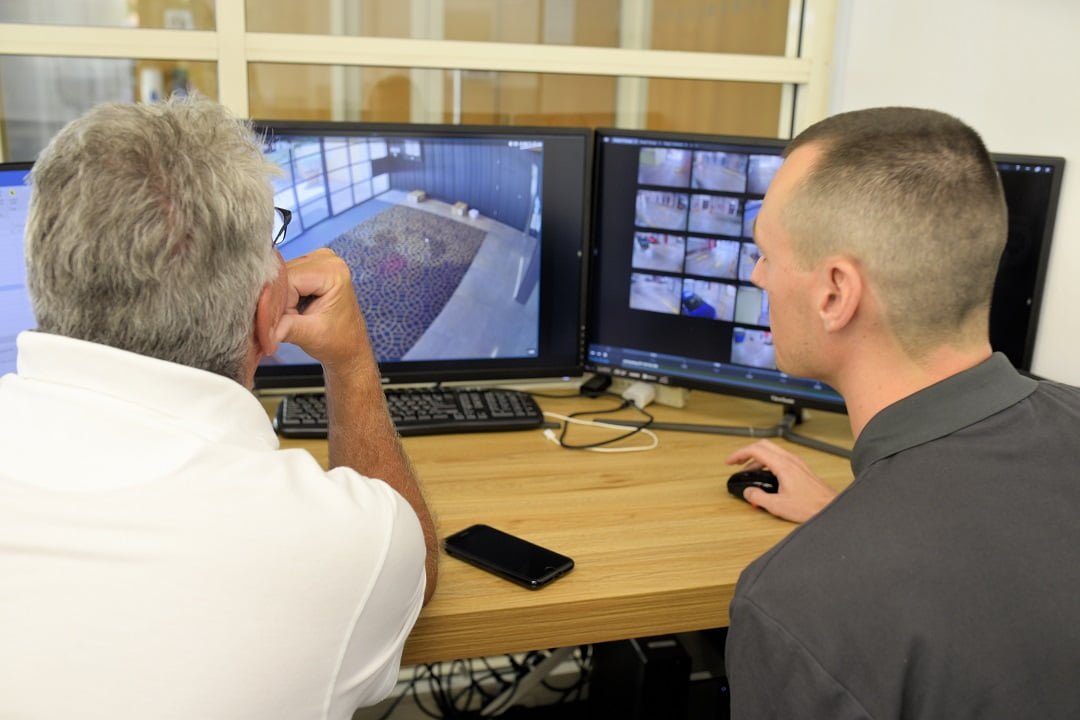
On the CCTV side, selecting cameras capable of handling backlight and low light situations ensured performance in carparks and during the night met expectations. WDR was a particular consideration for North-facing cameras and carpark cameras.
“The Hikvision cameras do very well in the entry areas,” Charles says. “We’ve seen no backlight issues at all outside, or in the parking area looking out into sunlight, which asks a lot of a camera.”
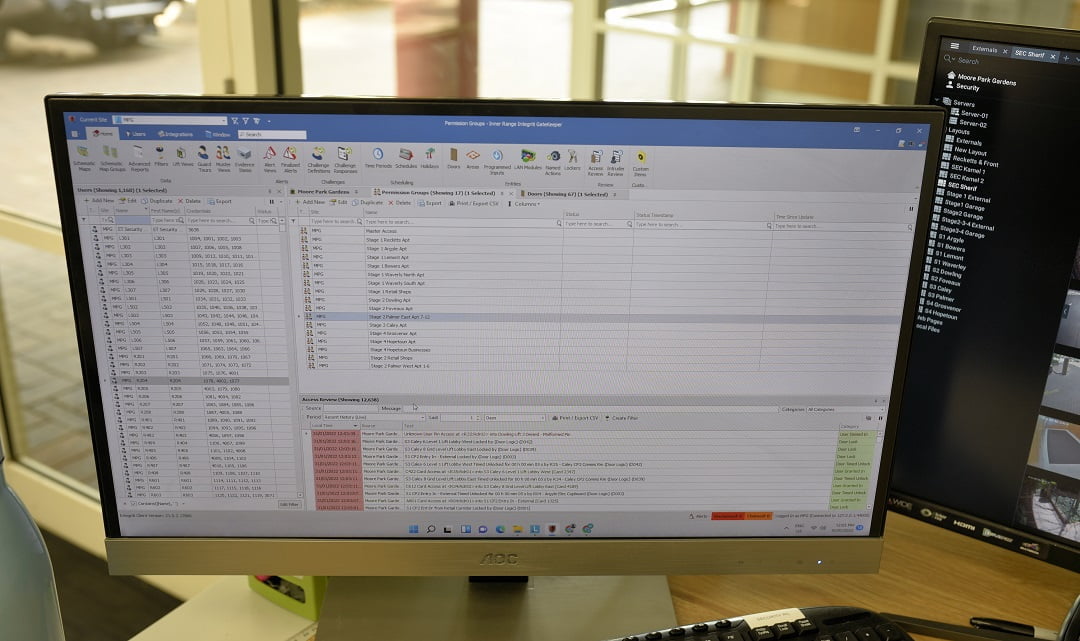
Charles explains that one of the most important elements of an installation like this is ensuring total engagement of the building managers and that was a challenge the team needed to meet twice.
“Management needed to understand how important it is that they do their part to get the new system up and running,” Charles says. “Organizing forms and facilitating programming of the system were vital – each person who has had that role as building manager has had very strong buy in, which has made our task easier.
“Managing strata interest groups has been more difficult because of the group numbers and the difficulty of getting consensus with larger committees who may not understand security operations. Large numbers of people wanting to tag along on walk arounds also required planning prior to the installation.”
Driving The System
Our first port of call is the building manager’s office and as we arrive the boys tell me that the space has been completely changed through the installation process, including having walls moved – this process was not complete when I visited.
The security workstation in the office is a relatively compact affair – a desk with 3 monitors, 2 showing Nx Witness VMS supported by a nearby server, and a single monitor showing access control and alarm events around the site on Inner Range Gatekeeper software. The building management and security teams are variously working in this space, with security arriving at 6pm to handle nights.
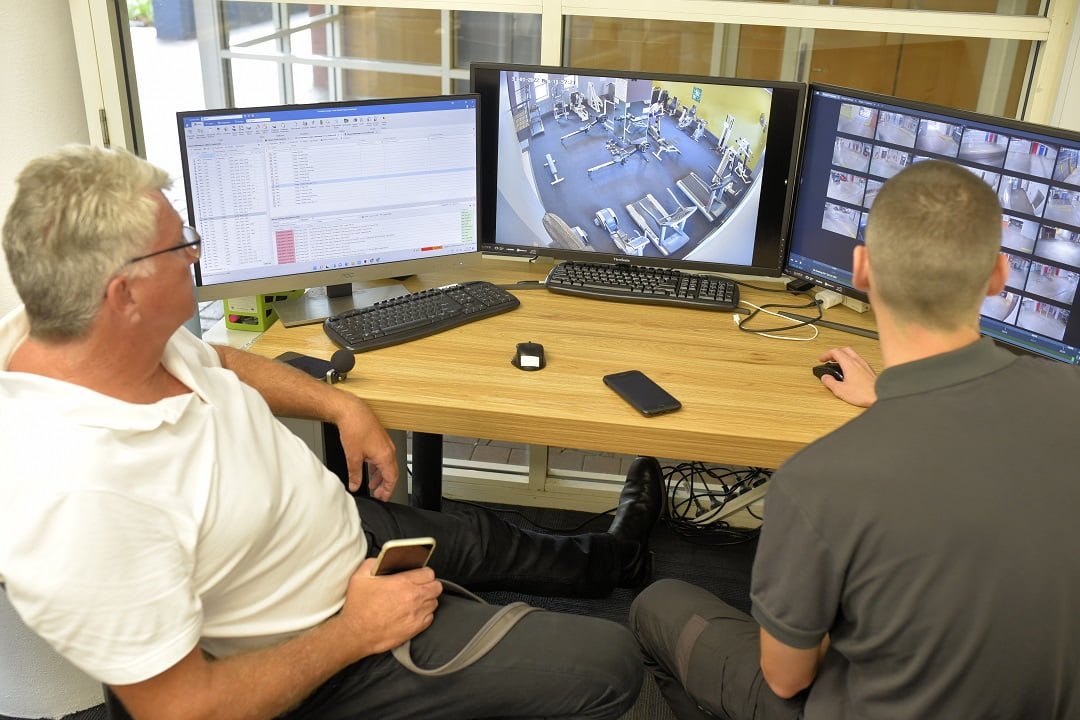
Charles and Sisson sit down at the workstation and show me through the system. My first impressions are the strong performance of the Hikvision cameras, my second is the eyebrow raising number of tiles open on the Nx Witness monitors – there are 60.
Unbidden, Charles makes the point it’s taking time to impress upon the security team they don’t need to have half the site’s cameras on screen at the same time.
“There have been a couple of small incidents since the upgrade and the security and management team have been able to sit in the office and review footage and see identifiable people doing the wrong thing, then take appropriate steps to resolve the issues – you can see the image quality,” Charles tells me.
As the boys move through the cameras, I can also see the way Charles designed the system – there are longer, tight angles of view in channels of entry and exit that provide easy face identification, as well as showing considerable detail of attire and carried items, while in open areas of the precinct, views are wider and overlap to ensure context is never lost, no matter the direction an evolving event might take.

“The operational focus has worked really well because the site is not too large,” Charles explains. “The distance between the lens and subjects is never so far that it’s not possible to achieve court admissible face recognition, if not identification, of people or vehicles moving around the site. This has allowed management to get good quality images of incidents to provide to police.”
A point of interest for me is WDR performance, as well as low light performance in the carpark areas – the Hikvision cameras are doing well with this – colour rendition is good and there’s loads of detail.
Driving the system, Sisson points out that a particular benefit of new CCTV system is that the coverage and high quality of the footage doesn’t only assist with managing safety and security, it also lets building management keep an eye on remote deliveries – this was appreciated during the last COVID lock down.
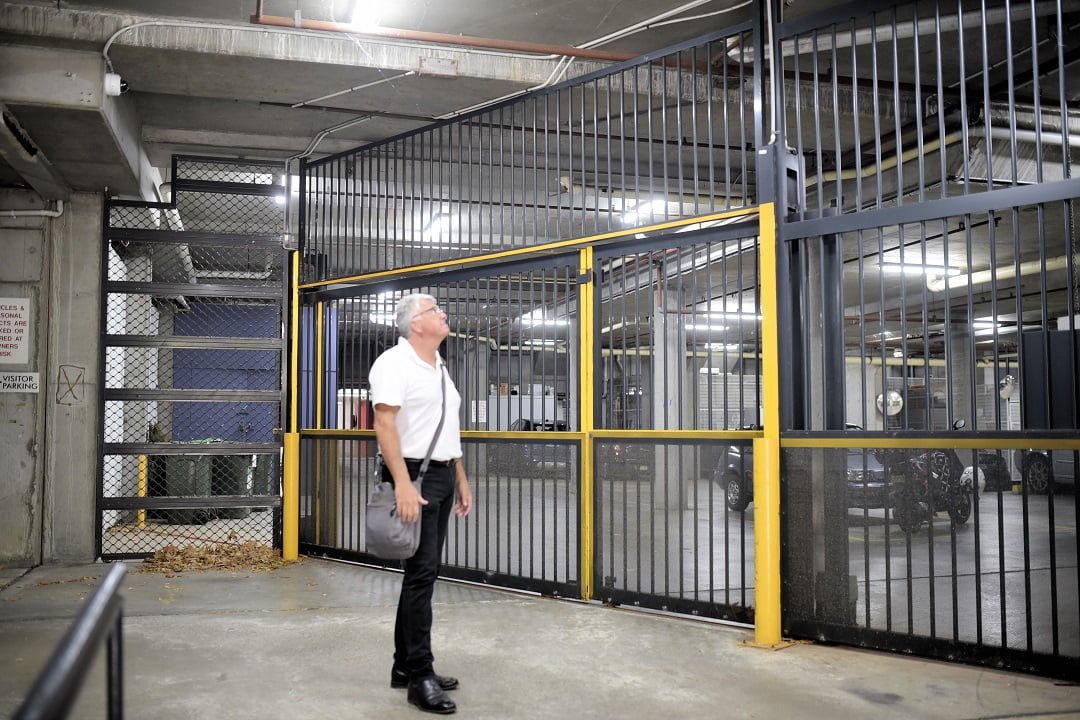
CCTV coverage is comprehensive, including the pool, gym, carparks, pathways, gardens, foyer areas. You could not move through this big site without being observed, particularly at night when things are quiet. Sisson points out that coverage of bicycle storage locations was a priority.
“We’ve had bikes stolen here, so it was important to have camera coverage of those areas,” Sisson says. “And you can see the cameras are doing a good job of the backlight carpark looking up the driveway, as well as over here in these darker areas.”
I can see he’s right – WDR performance is solid – we’re looking through the glare with good situational awareness. The camera handling low light levels in the carpark is brushing that challenge off. Maybe it’s the reflectance of the buffed concrete, or maybe there’s more light than there appears to be.
It might also be Hik’s low light colour performance, which has been improving strongly in recent years, with some new models contriving to deliver full colour in sub 1 lux. I also note strong performance in variable light – it’s a sunny day with deep shade and the external cameras are lapping it up.
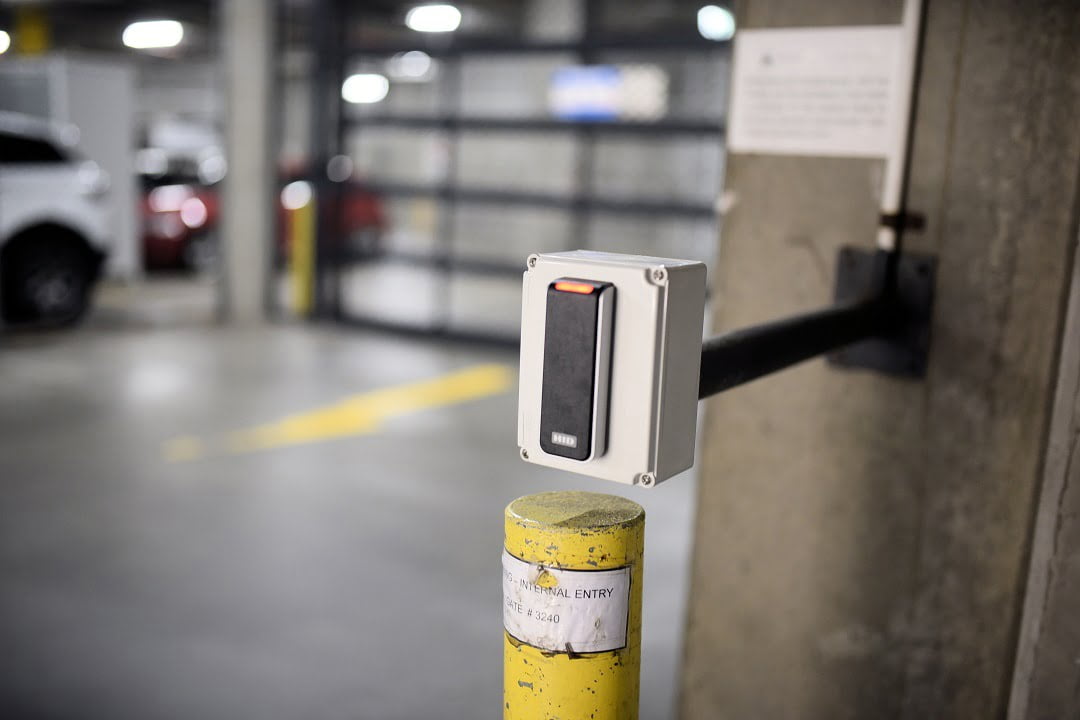
At this point I ask about frame rate, which looks to be about half live, and McMicking tells me the system is running at 6MP and 12ips, performance that maximises depth of field and detail, without losing much context in a site that experiences only pedestrian and slow-moving carpark traffic.
“We upped the resolution to its maximum and sacrificed frame rate to do so,” McMicking explains. “The pay-off in detail and reduced storage demand has been worth it.”
Walking the Site
Next, we take a look at nodes in the carpark, with switches and storage located alongside Integriti controllers. The nodes are compact, and the work is well done. According to McMicking, in the carpark the integrators went with vertical racks in new node locations, as well as leveraging some existing infrastructure.
After looking at the nodes, we tour the carpark, checking out pedestrian and vehicle access points, as well as the camera installation. It’s when you get underground with built infrastructure and trees out of your line of sight that the scale of Moore Park Gardens hits you. This is a seriously big development – the carpark stretches on and on, with comprehensive CCTV coverage of every angle.
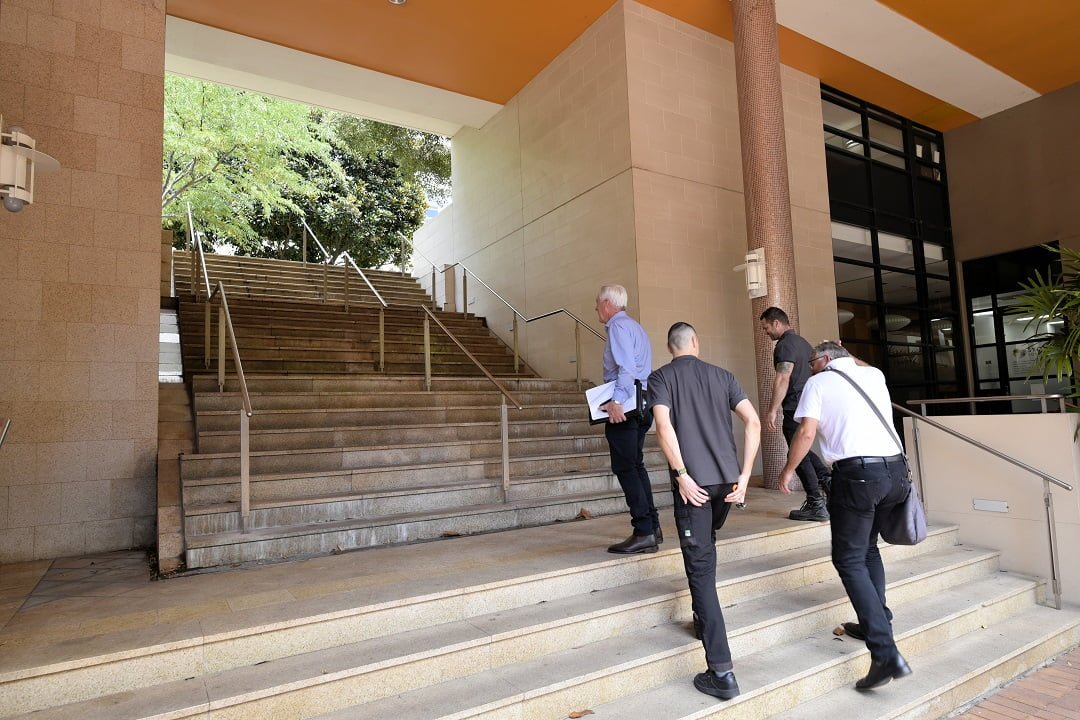
Installations in carparks are always entertaining, given the reinforced concrete and the challenges of selecting the best sight lines in the presence of massive building supports. Cabling here is nice conduited, and there are base plates and boxes located under the dome cameras. Running conduit and cabling from nodes to remote cameras would have been a process.
There are HID SEOS readers handling pedestrian access down here, as well as in residential foyers. HID SEOS is a solid choice – it supports cards, fobs and mobile devices using a range of wireless technologies, giving plenty of scope for the system to evolve.
The Nedap readers are installed in elevated positions overlooking vehicle entry points and standing at the entries you can imagine the trouble the older Magic Door wireless technology would have had in this application, with so much steel reinforcing, as well as metal sliding gates.
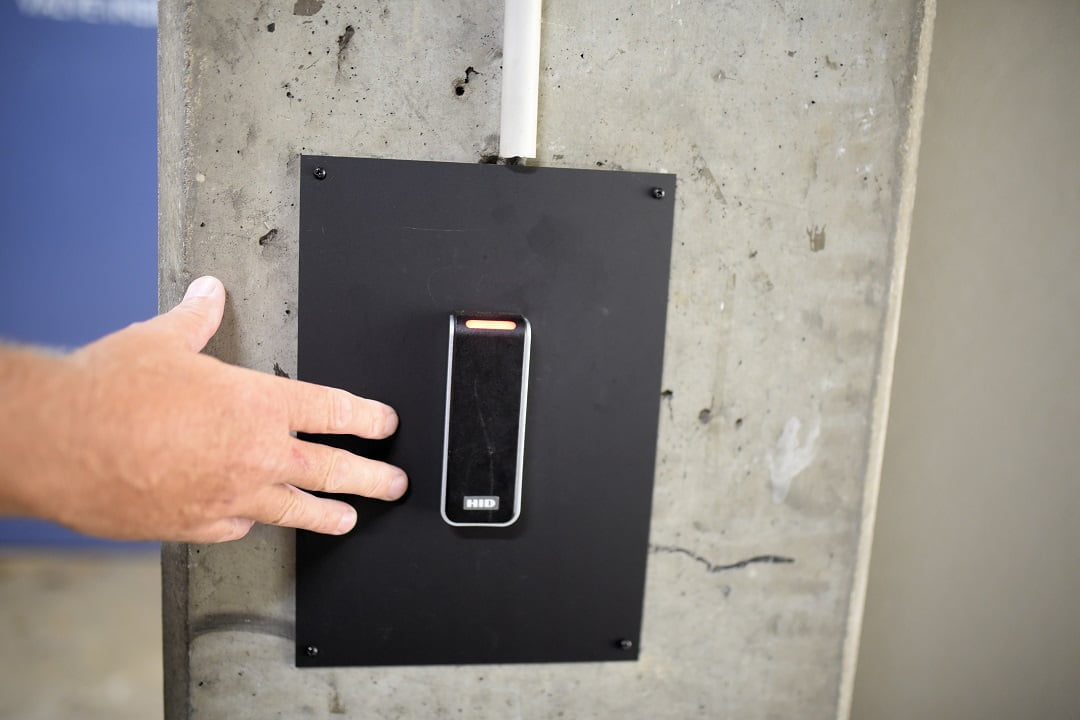
We head out of the carpark, take a look at the Tooth’s Brewery development, then wander through the residential areas. There’s are many public spaces and mature gardens here – not the easiest when it comes to future proofing camera views. As we go along, McMicking points out the challenges of external applications in which cameras are always exposed to the elements.
“Over time, even an IP66 or IP67 rated camera can experience perishing of seals when exposed to direct sunlight and thermal variations – in the end, you’ll find water will find a way in and can end up filling the camera housing completely,” he explains.
“For this reason, it’s important to choose the right camera form factor to ensure intrinsic protection – around the buildings we went with pendant-mounts which have an overlap over the dome base with cabling passing though the mount arm and then passing directly into the building.”
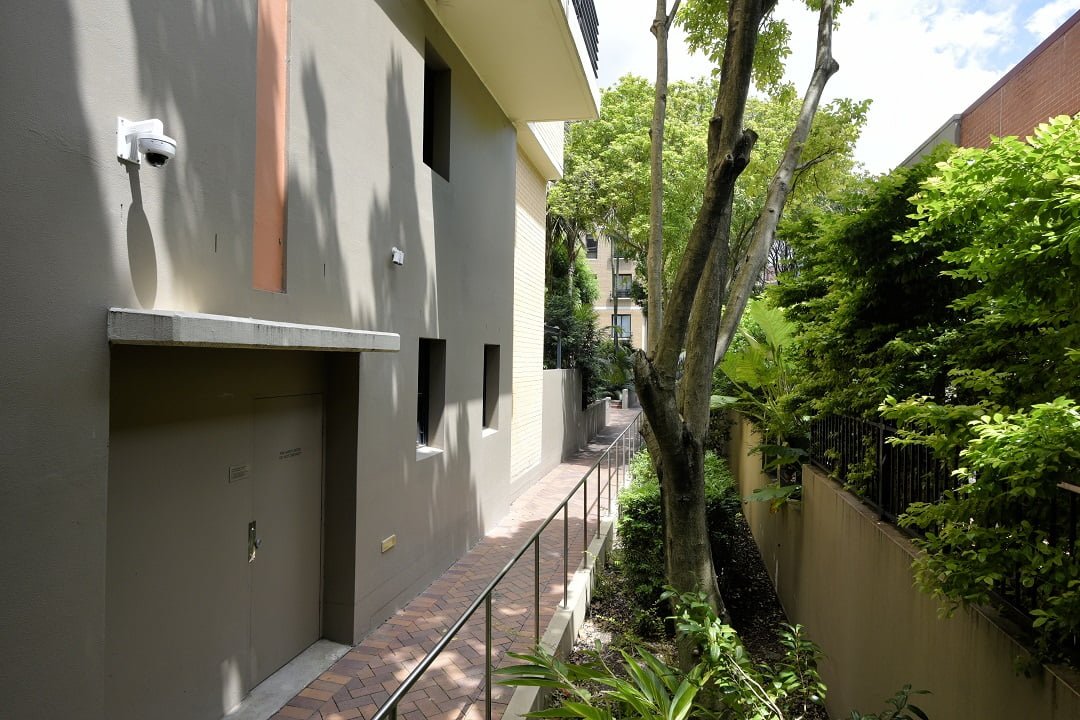
It’s such an enormous site I muse, as we wander around a small park and head down another palm-lined footpath – a complex built environment.
“It is,” agrees McMicking. “When Paul first walked us around the site during the tender process, we were looking at it and thinking ‘wow, this place is huge – how are we going to get this right, how are we going to plan it, and how will we manage it’. And that was before we found out there were no schematics for the security and electrical systems.
Conclusion
Moore Park Gardens is an interesting application. Any large residential tower comes with its complexities, but these are compounded when there are 5 residential towers, 530 apartments, 3000 residents, significant public spaces, heritage components, retail areas, parking for 700 vehicles, to say nothing of stakeholder management.
“It has been a long process – there have been COVID delays, there have been challenges with the original installation, we’ve had to deal with some level of resourcing issues including materials and labour – we’ve needed to deal with strata and other stakeholders,” McMicking says. “It’s probably been a 6-month installation – about twice the time it might have taken.
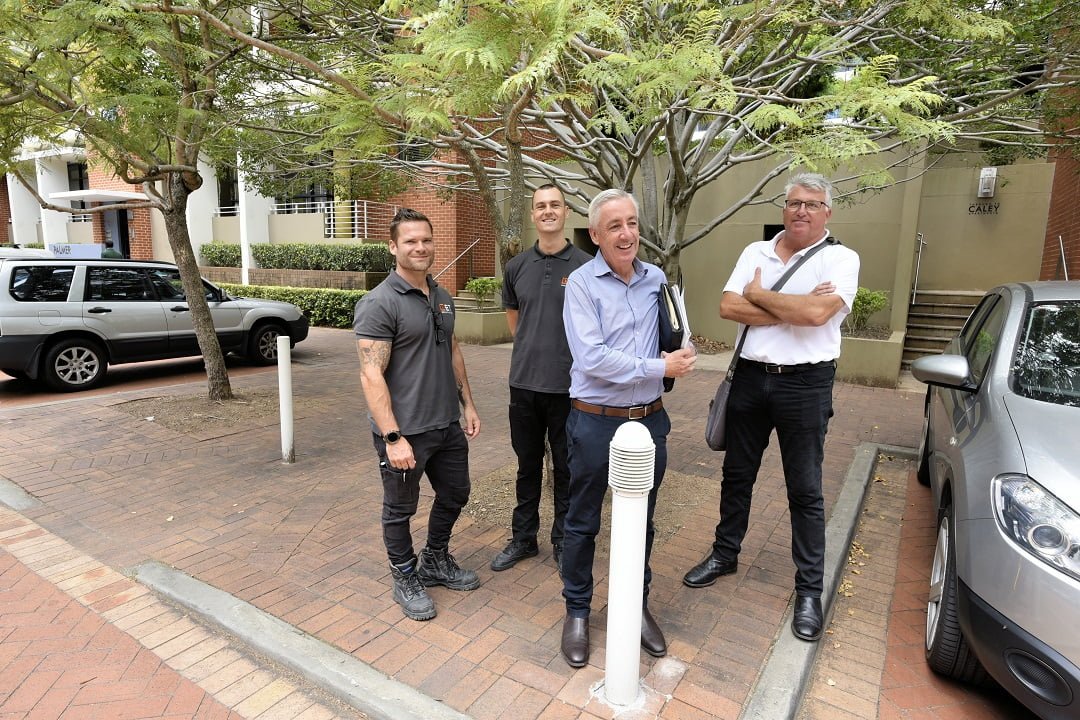
“All that said, working with Moore Park Gardens has been a great experience – given the layered challenges of the last few years we could not have asked for better support. Our points of contact have been excellent, and our techs have enjoyed working well with the building management teams here. We’re certainly pleased with the new system.”
According to Charles, building management has been very happy with the way the installation has gone.
“They are delighted with it,” he says. “From an operational perspective, they’re using the system a lot more because it’s so much more capable of supporting their security and building management teams. With this new system it’s not only a lot easier to learn how to operate, but it functions as it should.”
Find out more about Integriti v22 management software here.
ET Installs Integriti at Moore Park Gardens:
* Inner Range Integriti
* Inner Range Gatekeeper management software
* HID Signo readers
* Hikvision CCTV cameras
* Nx Witness VMS
* Designed by National Security Consulting
* Integrated by ET Security and Fire.




